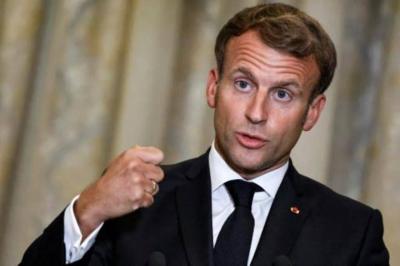French President Emmanuel Macron will head to the Kurdistan region and the city of Mosul in northern Iraq on Sunday, the second stop of his visit to Iraq after Baghdad, where he participated in a regional conference focused on "counter-terrorism" and developments in Afghanistan. This is Macron's second visit to Iraq in less than a year, reminding during the Baghdad conference that "France has stood by Iraq in its fight against the Islamic State."
In Mosul, which was partially destroyed after being under the control of the Islamic State for three years, the president will meet with students and influential figures before showing his support for Christians in the East by visiting the Church of Our Lady of the Hour, where Pope Francis prayed about six months ago for the souls of "war victims." He will also visit the site of the reconstruction of the Al-Nuri Mosque, which was destroyed by the extremist group.
Mosul was considered the "capital" of the Islamic State, which occupied vast areas of Iraq for over three years. Destruction is still evident in the historic Bab al-Saray market and the old city, with government sources estimating that over eighty percent of its infrastructure and buildings remain destroyed.
Macron's visit to Mosul comes the day after participating in a conference that included Egypt, Jordan, Iran, Turkey, the UAE, Kuwait, and Saudi Arabia, which was dominated by the rise of the Islamic State, defeated in Iraq in 2017 and in Syria in 2018 with support from an American-led international coalition, amidst the unfolding situation in Afghanistan with the withdrawal of foreign troops.
Macron announced in Baghdad, "We all know that we should not let our guard down as the Islamic State still poses a threat, and I am aware that fighting these terrorist groups is a priority for your government." In his concluding press conference, he stated that his country "will maintain a presence in Iraq to combat terrorism as long as Iraq wishes, regardless of the Americans' choice," emphasizing that "we have operational capabilities to ensure this presence."
The United States leads an international coalition in Iraq to combat the Islamic State, with 2,500 military personnel, but announced about a month ago its intention to end its "combat mission" in Iraq by the end of the year. While the end of the "combat mission" for the U.S. looms, with the transformation of the presence of American troops into solely advisory roles by year's end, Baghdad still faces numerous security challenges.
The Islamic State continues to possess the capacity to carry out attacks, albeit limited, even four years after its defeat, through cells that remain active in remote and desert areas, such as the attack last month that resulted in the death of thirty people in the Shiite neighborhood of Sadr City in the capital.
In Erbil, Macron will remind the Kurdistan authorities of "France's supportive role in combating terrorism," and will meet with Kurdish leader Masoud Barzani to honor the Kurdish fighters (Peshmerga).
The French president's delegation includes Nobel Peace Prize laureate Nadia Murad, a former captive of the Islamic State who is now advocating for the rights of Yazidis on international platforms, and feminist writer and activist Caroline Fourest.
Yazidis, a Kurdish-speaking minority in areas of northern Iraq and Syria, follow a monotheistic religion and have faced persecution for centuries from extremists who accuse followers of this faith of being "Satan worshippers." When the Islamic State took control of Mosul and its surroundings, jihadists swept through the Sinjar region, killing thousands of this minority's members and kidnapping its women and children.
According to the United Nations, jihadists abducted thousands of Yazidi women and girls who suffered horrific atrocities, such as rape, beatings, torture, and slavery, among other forms of inhumane treatment. According to the authorities in the Kurdistan region of Iraq, jihadists kidnapped more than 6,400 Yazidis, only about half of whom were able to escape or survive, while the fate of the remaining individuals remains unknown.




